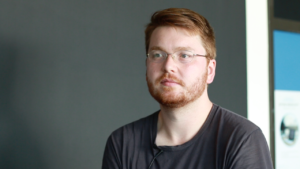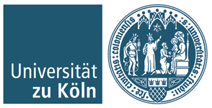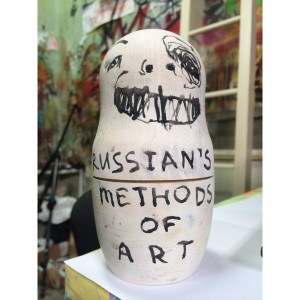J: I am Joe K, I am the events director here at the BHQFU which is the Bruce High Quality
Foundation University, more on that later. Right now we are in a temporary office for the school as a
part of the spring break art fair which is a curator driven art show. And BHQFU, which is the Bruce
High Quality Foundation University, is an ever changing, ever growing art education experiment that
came out of a larger collaboration between artists. The Bruce High Quality Foundation is a large,
large group of collaborative artists historically. It has been around ten years. They are the arbiters of
the estate of the late, great social sculptur Bruce High Quality who is a fictional character or a giant
foam head depending on who you are. Working collaboratively, for a great number of reasons, was
preferable to working as an individual artist for a lot of the artists involved. When you work
collaboratively that starts to look suspiciously like being in school. So to push that a little bit further
and to insist that it is school to start expanding and questions what education pedagogy and social
production and social sculpture can be is the driving force and impetus behind BHQFU which is
always changing. I always started our meeting by asking everybody if we should burn the building
down and quit. Which should always be an option and then everyday we move on from there. Yeah I
consider myself an individual artist insofar as I think I have a mental disorder where I have a neurotic
relationship to the forms of the world and the way they operate and I can’t help but present possible
alternatives. For that,… that sometimes manifests for me personally, historically in a altering
preexisting objects. There is just a certain way things are and I want to do a thing to them. In the
most simple way. I consider it a very fun mental disorder to pathologise myself. That being said my
personal involvement with the school, the object of that critique and neurosis is institution building
and pedagogical organizing. I am insisting on a lot of levels that what we are doing right now is art
and that is up for debate. Yeah, I think it is anybody who is rendering an alternative way of thinking or
looking at something and I think. You know, authorship is a big fun thing to consider. But anybody
who successfully renders an alternative way of thinking about or looking at the world in a way that
anybody else can care about.
A: My name is Andrea Brugler, I am the facilities manager at BHQFU and also a former artist in
residence in the summer 2004. That was sort of my first connection to the school or to Bruce High
Quality. I didn’t know anything about either existing organizations until I applied because it was easy
and free and it looked like a lot of fun. I didn’t really know what I was getting into all of a sudden. I
found myself months later hired by these amazing people. Part of this really great family and fighting
for free education.
J: It was 2014 by the way. You said 2004. Which is cool… if it feels that way then it’s true.
A: Yeah (laughs).
I probably feel more like an artist than I ever had before now that I am in this sort of family that we
have made but it is so much more about like seeing others grow as well and it does kind of like,
maybe I should never forget that we are all artists to begin with, but we do get caught up in being
behind the scenes like drivers of this thing for a little bit.
J: Well and to a certain degree just to give some history, we used to run a really egalitarian, really
anarchistic, inefficient way of running things. You know? So we have adopted a little bit of a division
of labour where you know, you just make the decision who has that responsibility and who has that
responsibility and that being said, we all do a little bit of everything. Like, whoever rises to the task, or
seems most suited or has the best idea is sort of how it all works out organically. So, as much as I
resent the sort of like militarized division of labour. That is just not how it works, but you have to put
something on a business card right?
Because yeah it is the perpetual annoying question and maybe a loop back to how Bruce High
Quality works. The foundation.
Everyone always wants to know who writes the lyrics and who plays the drums and internally, you
know, as an art project those are often the least interesting questions about an individuals identity
and autobiography and how it renders itself in the project. And then to a certain degree it almost
feels private at times. It’s like, as a collective artist we have produced this thing. And you’re not going
to like decrypt the whole thing because you know who touched what with what finger.
A: But at the same time it sort of like highlights just how institutions work in general.
J: BHQF which is the acronym for Bruce High Quality Foundation. If you take the U key and press
that then you have a new name. So we added a U to it at the time. Actually, at that time I am not
sure who all was involved specifically but I was around to add the U to it, and it becomes a different
thing and then you can fill that U. The U is sort of like a cup shape when you type it out and then
you can fill that with a lot of different things and dump it out, and refill it. No I mean the very first
beginning is like a cloud of history. Sort of indeterimnable. It is hard to say where every piece of
every idea came from. The curriculum originally was run by a program called „BYOU“ build your own
university and we just had an open door every week. This was in 2009, 10. And every week
someone would show up and propose a project and in as an egalitarian was as possible people
would just informally support or we would vote on what was going to happen and we tried lots of
things and it happened very informally, then we went on this long tour which I can talk about later
across eleven cities in the United States, doing a lot of research and vandalizing the possibilities of
self organized or dis-organized free education. When we came back we got a new space and spent
a good year with 30-40 peers meeting once a week developing curriculum. For almost a year we
had one class called curriculum and 40 people were in the class. We were looking at the history of
arts education and so on and so forth and through that class we started to invite people to teach our
first semester on Avenue A. This would be 2012ish when the world was going to end. But that didn’t
happen so then we kept going and then from then on it has been a fairly, at arms length tapping of
other adjunct faculty in terms of who is teaching. We have tried a lot. A lot of really shitty journalism
has tried to encapsulate our whole programming like. „everything from this crazy thing to this crazy
thing, to this crazy thing…“ Um and we have our own (?) very entertaingly, and right now we are in a
very conservative formal place where we have a painting critique class. That talks about paintings.
They can argue that is or is not a painting. A sculpture forum. I won’t list it all, but we have retreated
into some pretty medium specific things. There is a lot of fights to fight and right at present the
difference between painting and sculpture is not a fight to fight, so there is two different classes.
That being said, we are open to a lot of experimental things. So we keep our Thursdays, Fridays and
Saturdays mostly free and clear in terms of our curriculum to try new things.
A: I don’t teach a class but I am the study hall monitor for Friday’s events which is kind of an open
door hangout, free coffee, take a nap, whatever you want. But, I do attend certain classes religiously.
I really like the poetry class and Sean’s comedy class from last week and stuff. Which is nice because
we always talk about how we get to go to school for free as our job also you know? So that is
always fun. Yeah. I don’t know maybe in the future I will teach a class in Spanish. I don’t know.
J: Yeah it is nice to think about as it being like work-study slash, building the institution slash, like, it’s
all kind of… all of the possibilities are rolled into one. There used to be the flippant language like,
every student is a professor and every professor is a student and that is true to a degree. Anyone can
kind of take up any role at any time but it is sort of more nuanced than that. There is a lot of slippage
between what happens. I taught a more discrete performance class for a year. Performance art
critique class and workshop. There is a huge amount of exchange in learning and then furthermore,
the institution kind of learned a lot. Collectively.

















